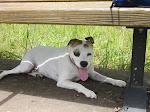March 2007 Mad Cow News
Canada a 'controlled risk' for mad cow
Canada has, according to this story, won recognition from a review panel of the World Organization for Animal Health for taking the proper measures to control the risk of mad cow disease and is recommending Canada be among the first small group of countries classed in the ``controlled risk' category for the brain-wasting disease.
The story says that the United States is also known to be among the first group, although the list of recommended countries has not been publicly released. FSnet Link
OIE rates U.S. beef a 'controlled risk' for BSE
A World Organization for Animal Health expert panel has classified U.S. beef as a "controlled risk" for bovine spongiform encephalopathy, which will allow Washington to lean more heavily on Seoul to open its meat market.
"If the initial ruling by the expert panel is approved by the OIE's general conference planned for late May in Paris, the United States will be in a position to demand great market access," a S. Korean agriculture official told Yonhap news agency on the condition of anonymity. Animalnet Link
2 in 3 restaurants willing to serve American beef
In its recent survey of 997 restaurants in Seoul and Kyonggi Province, the U.S. Meat Export Federation (USMEF) found that 65.8 percent of the respondents were cited as saying they would use U.S. beef for dishes. FoodHACCP Link
New twist in tale of BSE's beginnings
The discovery that a rare brain disease in cows can mutate into BSE has, according to this story, given new life to the theory that mad cow disease started out in cattle, rather than crossing over from sheep.
The story says that the new twist to the story comes from studies of a disease called bovine amyloidotic spongiform encephalopathy, or BASE. It was discovered in 2003, when two Italian cows, out of tens of thousands of European cattle screened for BSE at slaughter, were found to have a prion disease that seemed different from BSE. The BASE prion had a lower molecular weight and one, rather than two, sugars bound to it. The brains of cows with BASE were also damaged in different places from those with BSE, and had dense protein deposits called amyloid that are not seen in BSE. Similar prions have also turned up in France, Germany and Japan. New Scientist Link
Suspect feed the likely culprit in Canadian BSE case
A Canadian case of bovine spongiform encephalopathy discovered in February was most likely caused by suspect feed, the Canadian Food Inspection Agency announced Monday. FSnet Link
Creekstone wins testing case; appeal likely
A federal judge was cited as ruling Thursday that Creekstone Farms Premium Beef and other meatpackers have the right to test all the animals they slaughter for mad cow disease.
The story says that U.S. District Judge James Robertson immediately put his ruling on hold, pending a possible government appeal. If the government does not appeal by June 1, the ruling will take effect.
In Arkansas City, Creekstone general manager Kevin Pentz called the ruling a "moral victory" but said he expects there will be an appeal. FSnet Link


No comments:
Post a Comment